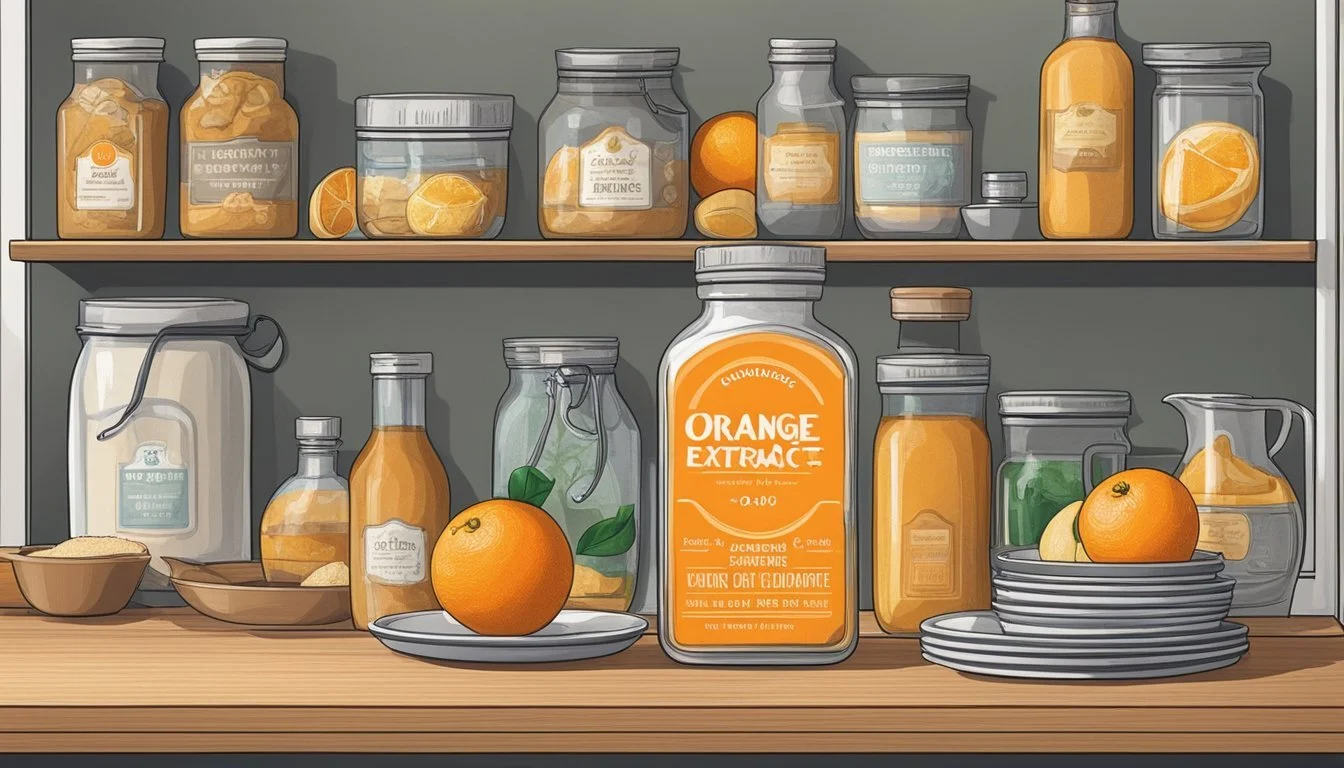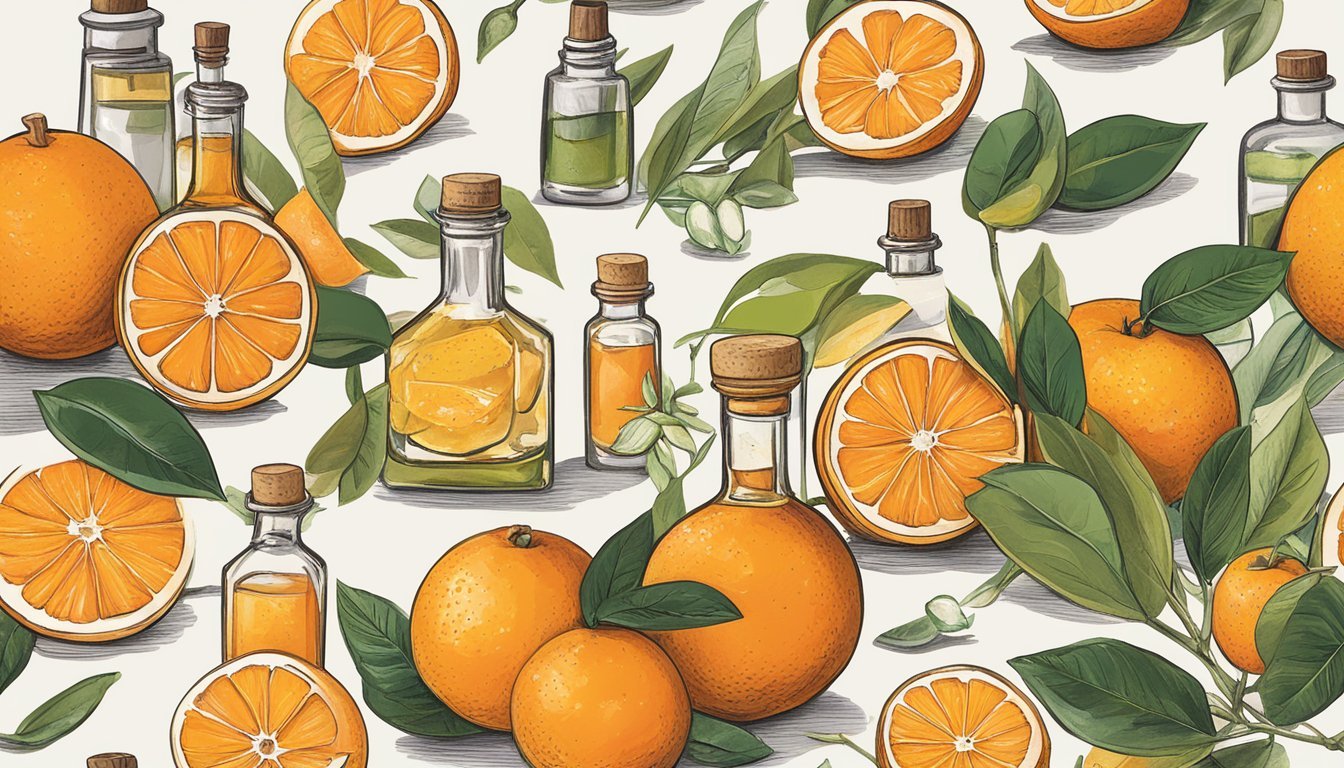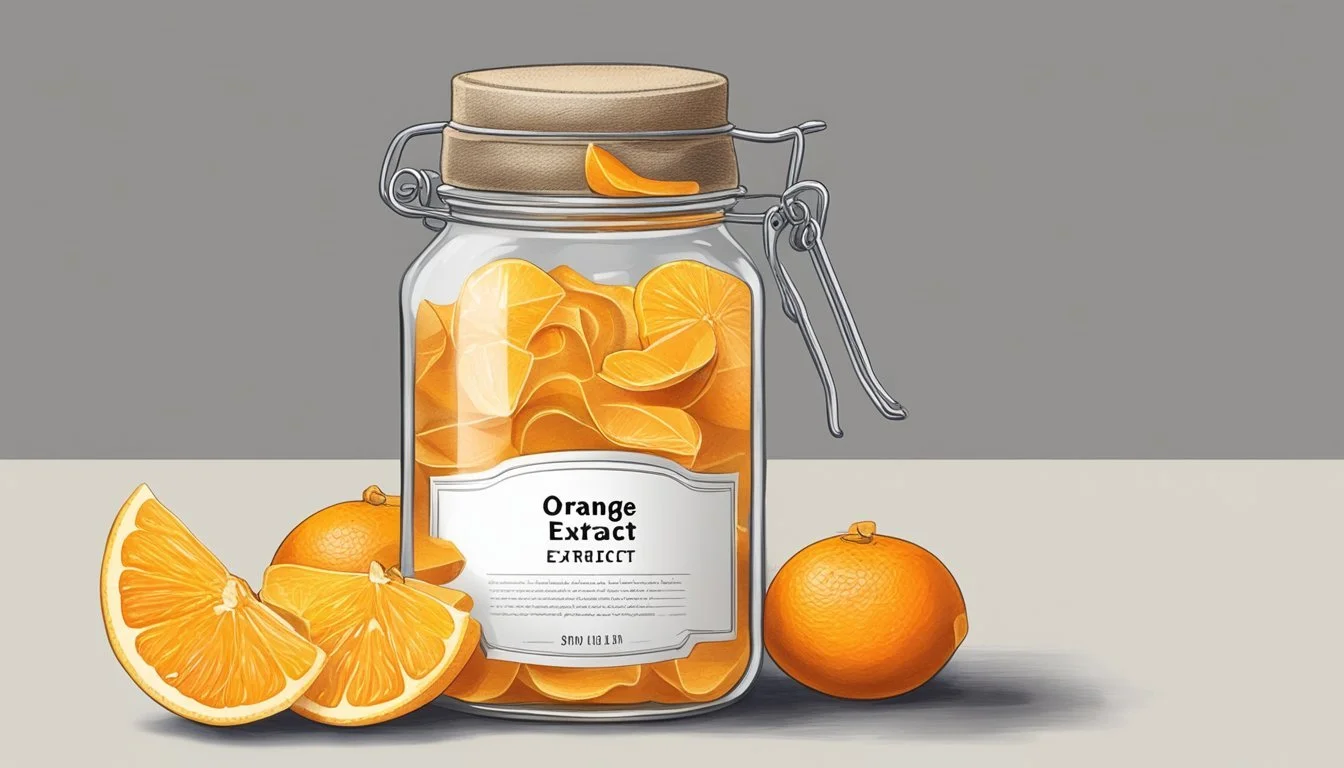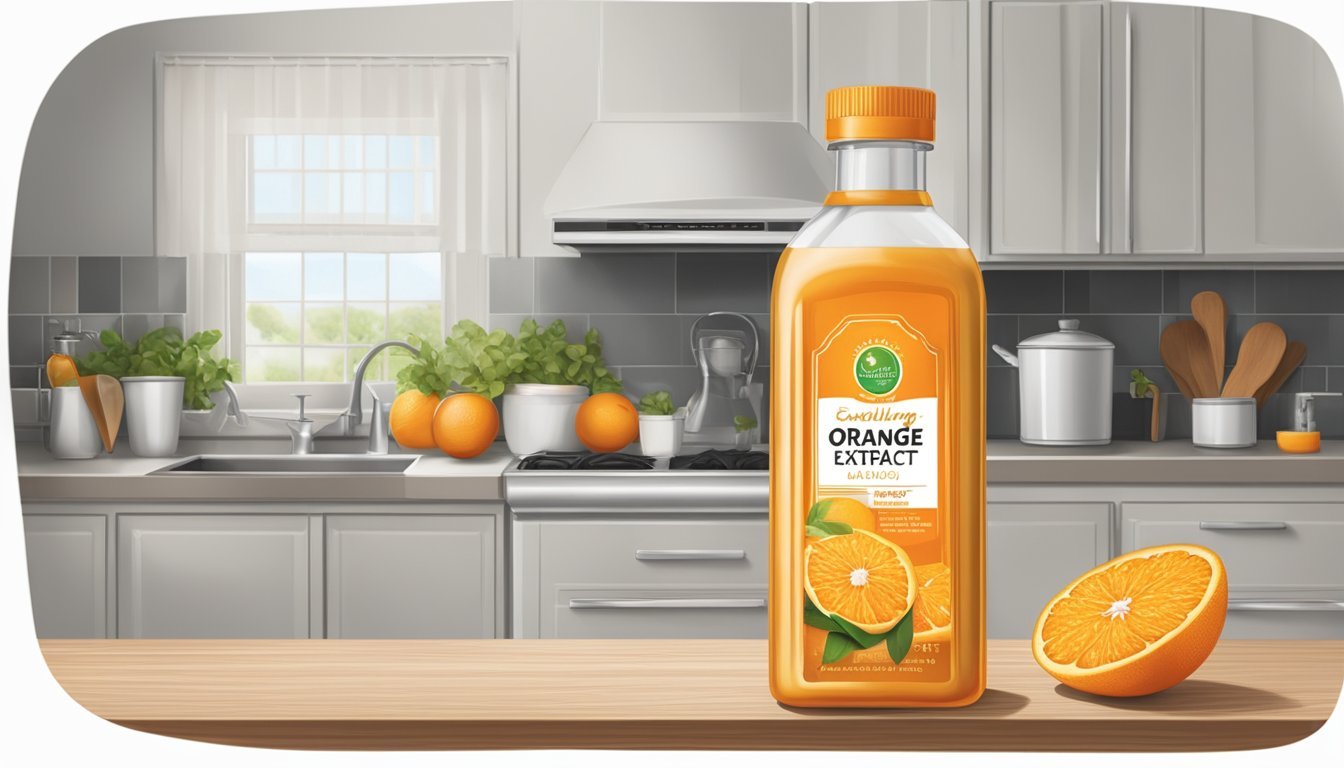How Long Does Orange Extract Last
Shelf Life and Storage Tips
Orange extract (how long does orange extract last?), a concentrated form of orange flavor, is derived from the essential oils of orange peels. It is a common ingredient in baking and cooking, imparting citrus notes into various dishes and desserts. The longevity of orange extract depends on several factors, including its purity and the storage conditions. A bottle of pure orange extract can generally last for up to two years when unopened and stored properly. Once the seal is broken, however, the shelf life typically reduces to about one year.
The essential oils within orange extract are sensitive to evaporation and exposure to air, which can lead to a gradual loss of its potent flavor and aroma over time. To ensure that orange extract retains its quality and extends its shelf life, it should be stored in a cool, dark place away from direct sunlight and heat sources. The container must be tightly sealed whenever it is not in use. It is worth noting that the shelf life of orange extract surpasses that of many other extracts, with the exception of pure vanilla, which can last indefinitely under optimal conditions.
Understanding Orange Extract
Orange extract is a potent ingredient used to infuse foods and beverages with a bright citrus flavor. It's a two-ingredient concoction, typically composed of alcohol and orange essence, including essential oils.
Components of Orange Extract
The primary components of orange extract are alcohol and the essential oils from orange zest or peels. Common choices of alcohol include vodka or rum because of their neutral flavors which allow the orange essence to shine through. The essential oils carry the flavor and aroma, making it a concentrated source of orange taste.
Alcohol: Acts as a solvent and preservative
Essential Oils: Provide the characteristic orange flavor
The Extraction Process
To create orange extract, orange peels or zest are soaked in alcohol. This process allows the essential oils to leach out into the liquid, creating a potent flavoring agent. Quantity and time can vary, but the goal is to reach a balance in which the extract has absorbed the robust essence of the oranges without becoming bitter.
Combine orange peels with alcohol in a sealed container.
Allow the mixture to sit, extracting the oils into the liquid.
Creating Homemade Orange Extract
Homemade orange extract is a versatile ingredient perfect for adding a punch of citrus flavor to baked goods and beverages. By selecting quality oranges and adhering to proper steeping times, home cooks can craft an extract with an impressive shelf life.
Ingredients Required
The recipe for homemade orange extract requires minimal ingredients, emphasizing the importance of their quality:
Orange zest: From 2-3 oranges, ensuring all white pith is removed to avoid bitterness.
Alcohol: A high-proof spirit like vodka or rum, which acts as a preservative and flavor extractor.
Preparation Steps
Successful preparation of orange extract depends on following a few simple but crucial steps:
Wash and Dry: Thoroughly wash the oranges to remove any pesticides or wax. Dry them completely.
Zest the Oranges: Use a zester or peeler to carefully zest the peels, avoiding the bitter white pith.
Steeping and Aging
The final flavor of homemade orange extract hinges on proper steeping and aging:
Combine Ingredients: Place the orange zest in a clean glass jar and cover with alcohol.
Seal and Store: Seal the jar tightly and store it in a cool, dark place.
Shake Regularly: Shake the jar once a week to distribute the flavors evenly.
Steeping Time: Allow the mixture to steep for a period of 4 to 6 weeks for optimal flavor development. The longer it steeps, the stronger the extract will be.
Storage and Shelf Life of Orange Extract
Understanding the proper storage conditions and shelf life of orange extract is crucial for maintaining its flavor and potency. Effective storage can significantly influence the longevity and quality of the extract.
Optimal Storage Conditions
Orange extract retains its quality best when stored in a cool, dark place, away from direct sunlight and heat sources. A pantry or cupboard away from the stove is typically ideal. The bottle should be tightly sealed to prevent evaporation and degradation of the flavor compounds.
Determining Shelf Life
The shelf life of orange extract generally ranges from 3 to 4 years when stored properly. The "best by" date can serve as a guideline; however, if the extract is stored under optimal conditions, it may remain safe to use beyond this date. Consistency, color, and smell should be checked before use to ensure quality has not diminished.
Impact of Storage on Quality
When orange extract is not stored correctly—such as in a warm, moist environment—it can lead to faster deterioration. The quality of orange extract is best preserved when the storage conditions include a tightly sealed container kept indefinitely in an environment that is both cool and dark. This prevents the loss of aromatic compounds responsible for the extract's flavor.
Practical Uses of Orange Extract
Orange extract, known for its potent flavor and aroma, has a diverse range of applications that can enhance many recipes. It is a versatile ingredient used primarily for its ability to impart a strong, citrus essence to foods and beverages.
Culinary Applications
In baking, orange extract is often used to infuse a vibrant, citrusy zest into a variety of desserts. From cakes (how long do cakes last?) and cookies to muffins, its concentrated flavor ensures a consistent orange taste throughout the product. Here's how it can be utilized in sweet treats:
Cakes and Frosting: A few drops can be added to the batter or icing to achieve a deep orange flavor.
Cookie Dough: It blends seamlessly into dough for baked goods like shortbread or sugar cookies.
Muffin Mixes: It adds a refreshing twist to breakfast favorites.
In cooking, orange extract finds its way into savory dishes as well. It can introduce a subtle sweetness and citrus note to meats and dressings:
Chicken or Pork: Incorporating orange extract into marinades creates a sweet and tangy profile.
Salad Dressings: A hint of orange extract can elevate dressings and sauces.
Ice Cream: Adding it to homemade ice cream mix introduces a fruity undertone.
Alternative Uses
Beyond the kitchen, orange extract has other noteworthy applications:
Cocktails: It can contribute to the complexity of flavors in various alcoholic beverages.
Aromatherapy: Its concentrated citrus scent may be used in homemade cleaning products or for a natural fragrance in aromatherapy solutions.
By incorporating orange extract into these various aspects of cooking and home use, one can add a burst of citrus that elevates the taste and scent of countless creations.
Comparing Orange Extract with Other Flavorings
In the world of baking and cooking, flavorings like orange extract are essential in capturing the essence of ingredients. When comparing orange extract to other extracts, one can consider factors such as shelf life, flavor intensity, and usage in recipes.
Orange Extract Versus Vanilla Extract
Orange extract, derived from the essential oils of the orange peel, typically has a shelf life ranging from one to four years, depending on whether the bottle is opened and how it is stored. Pure orange extract remains potent for about three to four years if stored in a cool, dark place with a tightly sealed cap.
Vanilla extract, on the other hand, is quite unique among extracts, as it can last indefinitely, even improving with age under optimal storage conditions. Unlike orange extract, vanilla does not degrade as significantly in flavor over time due to the stabilizing properties of the vanillin compound it contains.
Citrus Extract Varieties
Citrus fruit extracts, such as lemon and lime, similarly to orange extract, have a comparable shelf life of around one to four years. These extracts maintain their best quality if the containers are well-sealed and shielded from light, which can cause the flavors to deteriorate.
Lemon extract (how long does lemon extract last?), made from lemon oil, offers a bright, tangy flavor and is commonly used in desserts.
Lime extract imparts a tropical twist and can be used interchangeably with lemon or orange extracts in some recipes.
Peppermint extract (how long does peppermint extract last?) is another popular choice, especially in confectioneries, with a potent, refreshing taste.
Each of these flavorings is concentrated and should be used in moderation to avoid overpowering the intended flavors of the dish.
Nutritional Profile of Orange Extract
When considering the nutritional profile of orange extract, one should examine its macronutrient content, focusing on components such as carbohydrates and calories.
Macronutrient Content
Orange extract primarily consists of concentrated flavors from orange peels distilled into an alcohol base. It is typically used in small amounts, and therefore contributes minimal calories and carbohydrates to a diet.
Calories: Given its high concentration, a typical serving size of orange extract is about one teaspoon, which contains approximately 12 calories.
Carbohydrates: In a teaspoon serving, there are about 0.5 grams of carbohydrates.
Sodium: Sodium is generally negligible in orange extract, rendering it a low-sodium flavoring option.
Fiber: Since orange extract is a liquid used chiefly for its flavor, it contains no fiber.
It is essential to note that these values are averages and can vary slightly depending on the brand and formulation of the orange extract.
Discovering Orange Extract Recipes
Orange extract, with its concentrated citrus flavor, is an excellent ingredient to infuse a variety of recipes with the essence of oranges. It provides a robust flavor to baked goods and spirited concoctions with just a small quantity.
Recipes Featuring Orange Extract
Cakes and Cookies: Bakers rely on orange extract to add a zesty touch to their creations. A few drops can elevate the flavor profile of a simple vanilla cake, turning it into a fragrant orange-infused dessert. Similarly, traditional sugar cookies can be transformed into orange zest cookies by including orange extract in the dough.
Chocolate Orange Cake: Incorporate 1 teaspoon of orange extract into the batter for a rich chocolate cake with a citrus undertone.
Orange Glaze: Mix powdered sugar, orange extract, and a bit of milk to drizzle over pound cakes or bundt cakes.
Cocktails: Orange extract is used in cocktails to add a layer of flavor that complements the spirits without overpowering them. It is often employed in small amounts to craft sophisticated beverages like an Orange Martini or an Old Fashioned.
Classic Orange Martini: Mix vodka, a splash of orange extract, and a touch of simple syrup; shake with ice and serve for a twist on a timeless cocktail.
Citrus Old Fashioned: A drop of orange extract can be combined with bourbon, a sugar cube, and bitters for a cocktail with a hint of orange zest.
Other Foods: Beyond sweets and spirits, orange extract can find its place in savory dishes as well, lending its citrusy notes to sauces and marinades that can be paired with poultry or used to deglaze cooking pans.
Orange Glazed Chicken: Use a blend of soy sauce, honey, garlic, ginger, and orange extract to create a glaze that offers a sweet and tangy flavor to chicken.
Orange Chocolate Mousse: For a decadent dessert, fold orange extract into the chocolate mixture to give the mousse a nuanced taste.
DIY Tips and Tricks for Orange Extract
When making homemade orange extract, it is important to know the proper techniques for labeling and turning it into an edible gift, ensuring quality and personal touch in each bottle.
Homemade Extract Labeling
For those producing their own orange extract, labels not only serve as a marker of contents but also add a decorative touch. Users should consider creating printable labels that include the name of the extract, the date it was made, and instructions for use. This can help track the shelf-life and ensure proper usage. Labels might also include whether the link to the recipe is an affiliate link, and any additional time the extract needs before it is ready to use.
Creating Edible Gifts
Homemade orange extract makes an excellent, thoughtful edible gift for various occasions. When giving homemade orange extract as a gift, one might present it in an attractive bottle tied with a ribbon. Including a card that explains how to make orange extract and its uses in cooking can add a personal touch. Some might also consider pairing the extract with a recipe card or a small kitchen tool to enhance the gift-giving experience. Remember to highlight the orange essence as a special ingredient, elevating ordinary baked goods and dishes.
Safety and Allergy Considerations
When using orange extract in culinary applications, it is essential to consider safety and allergy implications that could impact certain individuals.
Allergen Information
Orange extract is generally safe for consumption by the majority of individuals. However, people with citrus allergies may react to orange extract as it is derived from the essential oils of oranges. In its pure form, the extract typically does not contain the most common allergens such as nuts, soy, dairy, gluten, or egg. Yet, it's crucial to check the product label for any additives that could introduce allergens.
For those specifically sensitive to citrus, they should consult the ingredient information detailed on the packaging. Some extracts might also be processed in facilities that handle other allergens, which poses a risk of cross-contamination.
It is also imperative for consumers to store the orange extract correctly—as recommended by manufacturers—to maintain its integrity and avoid any negative effects on health from potential spoilage.
Frequently Asked Questions
Before delving into the specifics, it’s essential to recognize that the longevity and usability of orange extract hinge on how it’s stored and whether it’s a commercial or homemade product.
Common Queries Regarding Orange Extract
How long does an unopened bottle of orange extract last?
An unopened bottle of orange extract typically retains its best quality for about 3 to 4 years if stored properly in a cool, dark place.
Can orange extract be used after its expiration date?
While it's not generally recommended, it may be safe to use orange extract after the expiration date if it still has its characteristic aroma and flavor—always taste test before use.
What is the difference in shelf life between homemade and store-bought orange extract?
Store-bought orange extract has a longer shelf life due to preservatives, often lasting 3 to 4 years. Homemade extract generally has a shelf life of about 6 months to 1 year when stored correctly.
Does the brand of extract affect its longevity?
The brand can influence longevity as high-quality brands may use better sealing methods and purer ingredients, potentially extending the shelf life.
How should orange extract be stored to maximize its shelf life?
Orange extract should be stored in an airtight bottle or jar, away from heat and light to maintain quality.
Is there a noticeable difference in using vanilla extract instead of orange?
Vanilla extract is not a direct substitute for orange extract, as it imparts a different flavor profile. Orange extract specifically offers a citrus note that vanilla does not provide.









